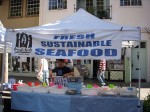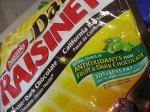As promised, though a bit late, here are some general guidelines for buying and consuming food as suggested by Michael Pollan in the ending chapters of In Defense of Food. He covers a lot of ideas while giving some advice and I will summarize here some of the ones I think are key. I reallyRead More
Tag: food
Somewhat sustainable seafood

I’m somewhat of a skeptic when it comes to seafood sustainability. I doubt that any fish farming endeavor is completely waste-free or low-enough-ecological-impact to be done at the scale that would be needed to wean our culture off of a meat (and soy) industry that is tearing up the planet. You may not be aware,Read More
I wanna be a street farmer
Will Allen is an urban farmer featured in this NYT article. He does interesting work in greenhouses to feed 10,000 local people. It is so exciting to see something great happening where it is needed most. Urban centers, especially inner city areas, often lack access to fresh produce. This has enormous implications for health because,Read More
Health claims galore! Get ’em while they’re hot!

“Helps lower cholestorol.” “Natural source of antioxidants.” “Low fat.” “Made with all natural ingredients.” You’ve probably seen them all. All these are health claims you might come across in any typical grocery store. The natural instinct for the consumer is to trust these types of statements. They are often backed by a government agency, afterRead More
The ever elusive…balanced diet?

One main point that Michael Pollan brings up is the general shift from complexity to simplicity. He means that nutritional quality is eventually sacrificed because the complex interactions and combinations of nutrients are being simplified by industrializing and processing food. Biological and ecological interactions that culminate in the plant and animal products that we consumeRead More
Nutritionists at work, one nutrient at a time
A good quote from page 62 of In Defense of Food: “The problem with nutrient-by-nutrient nutrition science,” points out Marion Nestle, a New York University nutritionist, “is that it takes the nutrient out of the context of the food, the food out of the context of the diet, and the diet out of the contextRead More